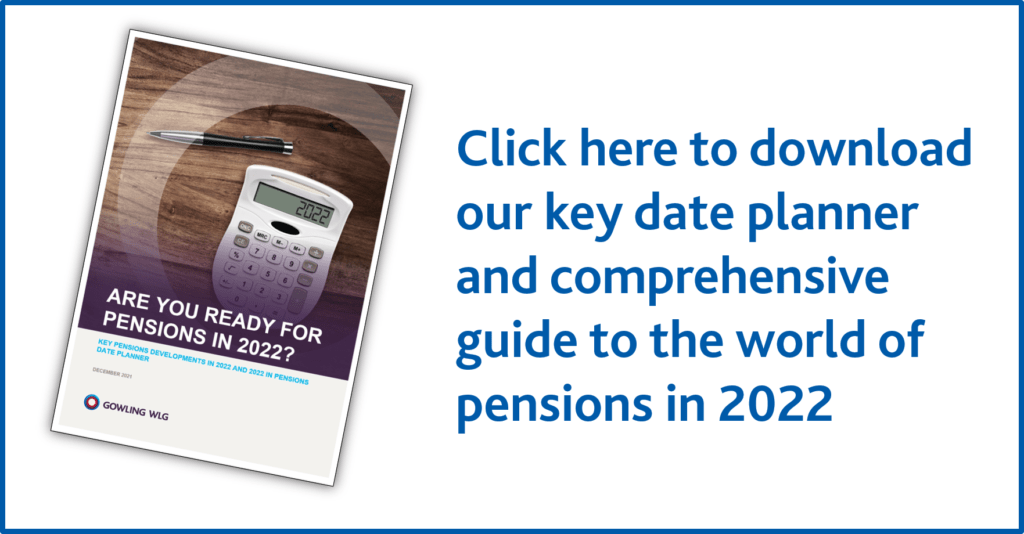1 October 2021 saw a material extension in The Pension Regulator’s (TPR) powers. In the coming year, TPR will:
- gain additional powers (with an extension to its notifiable events regime to cover certain corporate transactions expected to come into force on 6 April 2022);
- finalise its criminal sanctions and enforcement policies (expected early in 2022); and
- issue the final version of its Single Code of Practice (expected in Spring 2022 and to come into force in Summer 2022).
Extending the notifiable events regime to cover certain corporate transactions
A new notifiable events regime went into force on 1 October 2021. From this date, TPR was given additional powers to ensure compliance with the existing notifiable events regime. Next year will see an extension of the notifiable events regime that is likely to be of even greater consequence for those involved in defined benefit pension provision (especially scheme sponsors and their advisers).
New notifiable events in relation to certain corporate activities
On 6 April 2022, events in relation to certain corporate transactions will become notifiable to TPR. This broader notifiable events regime will require sponsoring employers to notify TPR when a ‘decision in principle’ is made in relation to certain key corporate transactions. These include:
- the sale of a material portion of the sponsor’s business or assets;
- the granting security over assets above a certain value; and
- certain corporate restructuring (e.g. changes in who controls the sponsoring employer).
New ‘notice and statement’ obligations on scheme sponsors
There will be a new duty on employers to give notices and statements to TPR that set out:
- the implications for a DB scheme of certain corporate events; and
- how any risks to the scheme will be mitigated.
The notice and statement will be required at a later point in a corporate transaction than the notifiable event notification. It will apply when there is greater certainty as to:
- whether the transaction is going ahead;
- the nature of the transaction; and
- the implications of the transaction for the scheme.
Click here for more on the new notifiable events regime in our Insight ‘Will your corporate activity be captured by new pensions notification requirements (23 September 2021)’.
Finalisation of TPR’s criminal sanctions and enforcement policies
In advance of the extension of TPR’s powers on 1 October 2021, TPR published the finalised version of its overarching policy on its criminal sanctions powers (click here for ‘TPR’s Criminal offences policy (29 September 2021)’). This was followed by consultations on four more detailed policies covering different aspects of TPR’s criminal sanctions and enforcement work:
- overlapping powers policy – TPR acknowledges that there may be occasions when its enforcement powers overlap. The overlapping powers policy provides more detailed guidance on how TPR will act when it has a choice of enforcement powers available to it.
- monetary penalty powers policy: high fines (avoidance) – under new legislation, TPR has the power to impose a penalty of up to £1 million for the offences of avoidance of employer debt and conduct risking accrued scheme benefits. TPR refers to these penalties as ‘high fines’. TPR has discretion in deciding whether to impose such fines and how much to impose. The monetary penalty powers policy: high fines (avoidance) policy provides detail on how TPR will approach its discretionary powers. TPR proposes three bands, which are determined by:
- the level of culpability; and/or
- the level of harm done.
The policy also sets out a range of mitigating and aggravating factors that would determine the level of a fine within those bands.
- monetary penalty powers policy: high fines (information gathering) – TPR is also given the power to issue a financial penalty not exceeding £1 million in relation to breaches of its information gathering powers. TPR proposes to follow the same approach as with high fines for the offences of avoidance of employer debt and conduct risking accrued scheme benefits outlined above.
- information gathering powers policy – TPR also sets out how it proposes to use its broader information gathering powers. Broadly, TPR will aim for voluntary disclosure and attendance at interviews. This may then escalate to compulsory statutory requests. In addition, TPR outlines cases in which voluntary requests are not appropriate (in which case, TPR will move straight to compulsory statutory requests).
It is expected that final versions of these policies will come into force in Q1 2022.
TPR’s single code of practice comes into force
TPR currently has 15 codes of practice. The codes set out the Regulator’s expectations of the conduct and practice trustees should meet to comply with their duties in pensions legislation. The existing codes of practice are in the process of being turned into a single code of practice. TPR believes this will makes its code of practice clearer, more accessible and easier to update. Once complete, the single code of practice promises to provide an up to date and consistent source of information on scheme governance and management.
Over summer 2021, TPR consulted on a draft single code of practice covering 10 of the 15 existing code of practice. It received a total of 10,000 answers from over 103 respondents. Since then, TPR has been working on a final draft that would be laid before Parliament. It is expected that this will happen in spring 2022. The single code of practice would then come into force in summer 2022. The remaining five existing codes of practice are expected to be incorporated into the single code of practice in due course.

About the author(s)
Ian is a London-based professional support lawyer (PSL) legal director. Ian is a member of our pensions and combined human resource solutions (CHRS) teams. He works with clients to solve their employment and pensions law issues. Ian maintains a particular focus on 'crossover' issues that benefit from his understanding of both areas of law.

